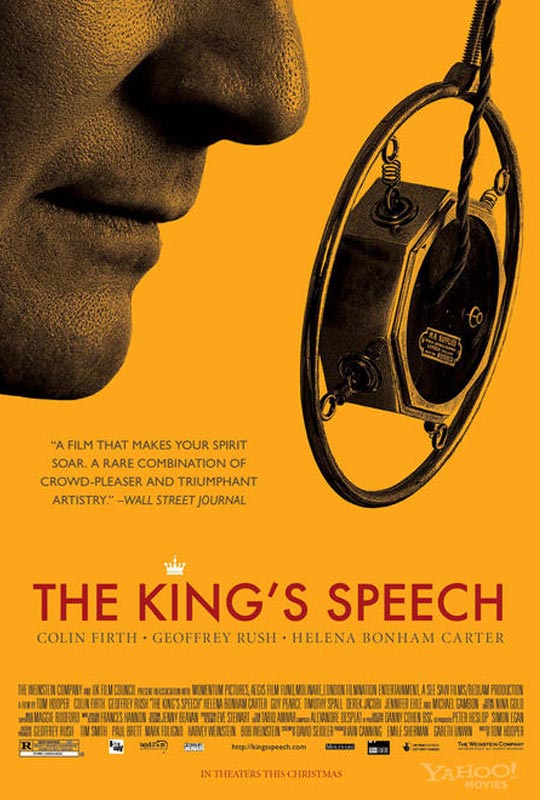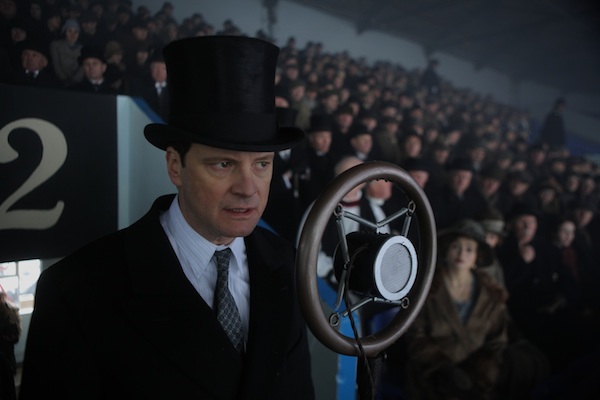This historical drama is based on the true story of King George VI who overcame a stuttering problem to deliver an important wartime address to the English public. It’s also an Oscar darling…
Stammering is the new black.
It’s always been fashionable for awards juries to hand out their little gold statues to films that feature disabilities, be it cerebral palsy (“My Left Foot”), schizophrenia (“A Beautiful Mind”), or autism (“Rain Man”). Oscar in particular loves stories of people overcoming their severe limitations by sheer force of will. The beauty of historical biopic “The King’s Speech” is that it has a lot more to love than just the defeat of the ailment du jour.
That’s because triumphalism is merely a surface concern here. This film is much more interested in the concept of interpersonal power and how it can be subverted, played with, and shared. The dynamics of power play between equals, subordinates and even a nation’s entire population.
I’ll elaborate on that. First the plot, to establish our footing. Prince Albert the Duke Of York (Colin Firth), son of King George V (Michael Gambon), suffers from a terrible stuttering problem. It is a socially crippling affliction that earns him the scorn of the English public. The film opens with him delivering, or rather failing to, a royal address at Wembley stadium in 1925. This issue is made all the more pertinent because his father is the very first ruler to use the electronic mass medium of radio to communicate with his subjects. George V recognises the rise of this technology as a necessary evil to exert and maintain influence.
George V desperately needs an heir who will not just look like a king but sound like one as well. On air, Prince Albert sounds like a village idiot. It doesn’t help that the next-in-line to the throne, Prince Edward VIII (Guy Pearce), is more interested in romance than ruling. Realising how dire the situation is, Albert’s wife Elizabeth (Helena Bonham Carter) takes her husband to see a speech therapist. Lionel Logue (Geoffrey Rush) is an Aussie operating in London, renowned for his unorthodox methods and his incapacity for bullshit. He agrees to take on the difficult task of treating Albert, on the condition that everything is to be done his way, with His Royal Highness reduced to an equal.
What follows is absolutely hilarious. I was somewhat caught off-guard by just how funny this film is. Writer David Seidler’s screenplay is loaded with razor-sharp repartee and clever comebacks. Some of the humour is broad and goes straight for the funny bone, while other moments are subtle, their wit taking a little time to sink in. “The King’s Speech” also features the year’s best use of profanity. Hands down. I won’t spoil the joke for you, but if ever there were a case to be made for the legitimacy of the F word (no, not ‘fornication’) in the English language, this would be an unassailable example. What makes it funnier is hearing it coming out of the mouth of a stuffy British royal, for whom decorum is paramount.
Some of the comedic brilliance doesn’t even come from the written word. That’s where the actors bring their true worth. There is a recurring gag where Logue looks completely unprepared and awkward as to the protocol for greeting royalty. Geoffrey Rush kept doing this ridiculous half-bow, half-curtsey, and I couldn’t help cracking up each time. Typically with British humour, everything is downplayed with dead seriousness, which is what makes it so effective. Don’t get the wrong idea, though. This is not some sort of wacky sit-com ala “Black Adder”. It is very much a drama, albeit a rather human one, graced with many moments of lightness arising out of people being themselves, in spite of themselves.
In lesser hands, the role of Prince Albert would quite easily come across as a one-note caricature, even with the masterful script creating form and colour. Colin Firth makes the man human, and mind you it’s much easier said than done. Good actors would get by on approximation and mimicry. Firth is a great actor. He allows his performance to breathe, waiting just a beat longer to really drive home the sense that there are thoughts and feelings that precede each titanic struggle to enunciate. He also paces his words like a boxer feigns his jabs, going quiet and slow right before he explodes in a sudden outburst. It renders his Prince Albert a very real person fraught with real, uncontrollable emotions.
It sure helps that Firth has such accomplished performers to bounce off. The term “supporting actor” has never been more apt, as Rush and Carter lend their full support to really elevate the material. Carter has in the past been guilty of overcooking her line deliveries, but this time she keeps it in check, understanding this is Firth’s show. Her Elizabeth is a warm, gently encouraging force, as any good wife should be. I liked her in this role.
Where “The King’s Speech” truly comes into its own is in its scenes between Firth and Rush. It is the heart and soul of the film. Rush is always a delight to watch because he’s one of those actors who does so much with so little: a simple look, the slightest shift in posture, or a change in inflection. Watching the two of them play off each other is a masterclass in acting. It is also here that the film crystallises its most significant theme, the one I mentioned earlier.
Through his sessions with Logue, we learn that Albert’s stammering can be traced back to his childhood, where his father’s overbearing ways left him feeling small. The irony is that his personal power was stripped away even in the process of being groomed as a future king. Then in adulthood, he has the authority but not the respect of the public. It is only once he triumphs over his speech impediment to smoothly deliver a crucial wartime message that the power of respect finally returns to him. Conversely, the people find themselves empowered by a figure whose subsequent speeches turn him into a symbol of British resistance during the war.
The question all this raises is an interesting one: In an era where democracy has increasingly little use for monarchy, who actually wields the power? The filmmakers seem to subscribe to the power of One, be it in the guiding hand of Logue, or the influence of Edward VIII’s mistress on his decision to abdicate his throne, or most obviously, in the newfound ability of the man who would be King George VI to inspire his subjects through the magic of the spoken word.
Director Tom Hooper, leading a team of fine artisans, has not only crafted one of the year’s best films, he’s given us a tale that transcends its period setting. The film contains a very contemporary subtext about electronic mass media, making it all the more relevant to today’s society, what with our current preoccupation with blogs, tweets and social networking. It’s no longer the domain of the elites; the power is now with everyone.
That kind of timely message has seen “The King’s Speech” sweeping all major awards shows and speaking to global audiences to the tune of over US$200 million on a budget of just US$15 million. Talk about being in the black.
Storyteller by trade and dreamer by nature, Wai has been deeply nuts about the celluloid world since the first time he discovered he could watch a story instead of reading it. But he likes writing about it. Wai goes by a single name because he likes to avoid any “Imperial entanglements” (a.k.a. “conflict of interest with the powers that be” for those of you who don’t speak Star Wars) in his employment. Plus, cool people use one-word names. He has just set up a movie website, the first of its kind in Malaysia, in an effort to foster greater filmic knowledge for the rakyat. Check out Electroshadow.



Hi beatnik, thanks for the kind words.
I think James Franco has been in some bizarre, chemically-induced funk for the last week or so. He looked totally zoned-out and disinterested during his hosting stint at the Oscars, and then there are the lame comments like the one you highlighted.
Personally, I think he's an idiot, because he's fast destroying all the hard-earned goodwill he earned for his great performance and subsequent Oscar nomination. If he's not careful, he's gonna end up a Hollywood cautionary tale…
Brilliant review.
On another note, James Franco called this movie a bit “safe”. It probably came from a bitter place; him losing out to Colin Firth for Best Actor and 127 Hours denied the Best Picture award. But I kinda have to agree with him (and what you mentioned early on in the review), since the Academy loves this type of movies anyway.